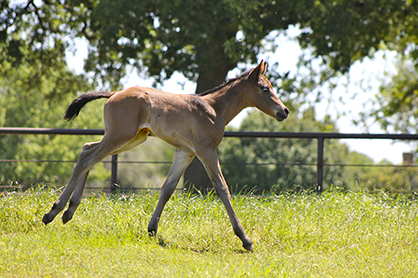Hagyard Equine Medical Institute First Private Practice in the World to Offer Rotavirus B Testing

Photo Credit: Brittany Bevis
Hagyard Equine Medical Institute announced that they are now offering PCR testing for Rotavirus B. The Rotavirus PCR test is available as a single test or as part of Hagyard’s Neonatal Panel or Foal Diarrhea Panel.
Rotaviruses are serious, life-threatening diseases that are highly contagious in foals. Rotavirus B was a novel strain discovered in central Kentucky during the 2021 foaling season. It was quickly identified as a new strain of Rotavirus, responsible for a wave of neonatal foals that presented with severe diarrhea between one and four days of age. Some farms even felt the effects of a 100% morbidity rate.
“This new strain caused considerable concern for our industry in the 2021 foaling season. To be able to offer testing moving into the 2022 foaling season is a great relief for our clients,” said Nathan Slovis, DVM, DACVIM, CHT of Hagyard Equine Medical Institute. His credentials also include Director of the McGee Medicine Center and he is considered a world leader in equine infectious disease response.
As with all Rotaviruses, biosecurity precautionary measures should be taken to reduce the risk of infection to other horse:
(1) Ensure that other horses do not come in contact with the infected foal,
(2) Utilize separate or disinfected tools to clean their stall or paddock, and
(3) Wear disposable gloves when working with the foal. Wash your hands when you are finished.
Bleach is ineffective against rotavirus, so disinfects such as Tek-Trol, Biophene, Environ, Accelerated Hydrogen Peroxide (Rescue) and Stroke-1 are examples of disinfectants that can be used.
Research is being conducted to better understand the virus and to develop a vaccine for young, susceptible horses. Current vaccines for Rotavirus A do not protect against the new B strain. To that end, Hagyard’s testing and Laboratory can differentiate Rotavirus B from Rotavirus A strains.
“Being on the forefront of challenging our industry’s problems is what has set us apart for the last 145 years”, Slovis continued. “Hagyard has always championed innovation to improve the care and wellbeing of these amazing animals.”
“We felt it was important that veterinarians both within and outside of the Hagyard practice have access to a lab like ours,” added Luke Fallon, DVM, who is the Medical Director of Hagyard Equine Medical Institute. “It’s a crucial component of any comprehensive wellness plan.”
Hagyard’s Laboratory offers its services to all veterinarians. Testing is available in blood bank, chemistry, Coggins, cytology, endocrinology, hematology, microbiology, PCR and serology. It has also won awards for its Laboratory Information System and is accredited by the Clinical Laboratory Standards Institute.
Additional information about Hagyard’s Laboratory can be found at https://www.hagyard.com/services-and-facilities/hagyard-laboratory
About Hagyard Equine Medical Institute: With more than 60 veterinarians and 145 years behind it, Hagyard Equine Medical Institute is the oldest and one of the largest equine veterinary practices in the world. Based in Lexington, Kentucky, the facility, located across the street from the Kentucky Horse Park, boasts superior ambulatory services, the world-renowned Davidson Surgery Center, McGee Medicine and Fertility Centers, Hagyard Laboratory, Hagyard Sports Medicine & Podiatry Center, and hyperbaric medicine facilities. For more information, visit hagyard.com.










